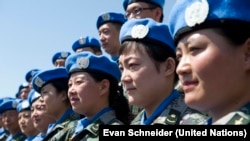China dispatched 130 additional troops to South Sudan on April 8 to fulfill a United Nations peacekeeping pledge to help secure the restive nation, which has been wracked by civil war.
The latest batch of troops joined the 570 Chinese peacekeepers who began deploying to the African nation in Janauary as part of an ongoing U.N. mission that has more than 11,500 uniformed personnel on the ground.
The peacekeepers are tasked with securing sites at U.N. bases and protecting civilians who’ve fled violence, which, according to Chinese state media, has killed more than 10,000 people and driven more than a million from their homes. Rights groups have accused the government, opposition forces and other groups of serious human rights abuses in the conflict.
Chinese state media say the latest deployment affirms Beijing’s growing role in global affairs. Daniel Wagner, CEO of U.S.-based Country Risk Solutions, says "like any country, China is both interested in protecting its interests as well as in projecting its power."
"Apart from the oil question, there’s the greater question of China stepping up to the plate in terms of accepting its responsibilities as a rising global power, and you could certainly look at Sudan as a test case, or a litmus test, in that regard,” he said.
After joining the United Nations in 1971, China refused to contribute troops or money to peacekeeping operations, reflecting Beijing’s policy of non-interference. But starting in the early 1990s, the country began joining U.N. missions. Recent years have seen a dramatic increase in the number of personnel China sends overseas.
The deployment to South Sudan marks the first time China has sent an infantry battalion on a peacekeeping mission. Chinese state media have reported that, contrary to previous Chinese peacekeeping missions, where soldiers played supportive roles, this infantry battalion has combat capabilities.
Yun Sun, a fellow at the Washington-based Brookings Institution, says China's troop increase may be designed to protect its massive oil investment in the region. In 2011, five percent of China’s oil came from South Sudan, and some of the worst violence has been in the oil producing states of Unity and Upper Nile.
“[China] would like to argue that [they] are contributing people ... [and] more resources," and thereby supporting global peacekeeping operations, she said.
"But on the other hand ... we realize that, 'Oh, China has significant oil interests on the ground,'" she added. "So China’s motivation may not be that altruistic to begin with.”
Chinese state media have heralded the soldiers’ deployment to South Sudan as proof of the country’s new role as a responsible, international stakeholder. The United States and the European Union have also welcomed China’s participation in U.N. peacekeeping missions, making Beijing a bigger part of the United Nation’s efforts at collective security.
But there are also signs that some in China could be destabilizing the conflict. Amnesty International’s Elizabeth Deng found evidence that last June a Chinese arms manufacturer had delivered a major weapons shipment to the country.
“Last year we were able to confirm a large shipment of arms from a Chinese state owned manufacturer, Norinco, a shipment of $38 million dollars of small arms and light weapons,” she said.
In September, Bloomberg News reported that a Chinese embassy official in Juba said the remainder of the contract had been cancelled in July after authorities determined it was “inappropriate.”
Amnesty International, other rights groups and some United Nations officials have called for an arms embargo in the conflict. Amnesty says the weapons are likely to end up with people on both sides involved in the killings of civilians.
The United States has instead supported a United Nations sanctions regime to take action against individuals seen as blocking peace efforts.
Several ceasefires have been violated since fighting reignited between ethnic groups in late 2013.




